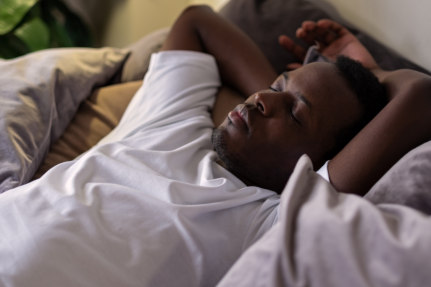Sleeping on your left side is best for your health - and can reduce snoring, experts say
Snoozing on your back with a pillow underneath the knees is also recommended - but kipping on your stomach can cause health problems, a study found.
16 April 2025, by Megan Anderson.

Experts have revealed the worst sleeping positions for your joint health – and it is bad news for tummy sleepers.
Dr Cheryl Lythgoe, Society Matron at Benenden Health, claims lying on your front can cause serious problems for the spine, joints and nerves – leading to chronic neck and back pain.
It can also increase the risks of breathing issues as the additional weight on respiratory organs can make it harder to breathe. Sleeping on your side was recommended the best overall position – especially for those who suffer with snoring or sleep apnoea.
The insights come after research of 2,000 adults, commissioned by not-for-profit healthcare provider Benenden Health, found one in five don’t believe their sleeping habits have any impact on their general physical comfort.
Sleeping on the right side was found to be the most common position (37 per cent), but Dr Cheryl says the left side is best – especially for those with heartburn or digestive issues.
Dr Cheryl Lythgoe said: "Sleeping positions that place undue stress on the spine, such as lying on your stomach or curling up in a tight fetal position, can exacerbate physical discomfort.
“These positions often lead to misalignment of the spine and increased pressure on the neck and lower back, potentially resulting in chronic pain and disrupted sleep patterns."
Lead physiotherapist at the healthcare company’s flagship Hospital in Kent, Jordan Dehara, also shared his recommendations for alleviating any joint pain – with pillows being the answer.
He said sleeping in the foetal position with a pillow between your legs, or sleeping on your back with a pillow under your knees, can reduce the load on your lumbar spine and hips.
Choosing an appropriate pillow is also key, but the research revealed 26 per cent of adults are unsure if the ones they currently use are suitable or unsuitable for the way they sleep.
It also revealed 38 per cent often experience aches, pains and soreness after waking up in the morning.
With a stiff neck being the most common consequence of a bad night’s sleep (31 per cent), along with muscle soreness (29 per cent) and headaches (15 per cent). But 70 per cent have never tried any remedies or treatments to address any of these problems.
Of those who have, 40 per cent have engaged in regular physical activity, while 34 per cent have forked out for over-the-counter pain relief. However, only 14 per cent have ever consulted a healthcare professional about sleep-related aches and pains, according to the OnePoll.com data.
It also emerged 27 per cent often experience difficulty trying to get sleep, with the average person waking up twice during the night. More than half (55 per cent) have adjusted their sleeping position to improve their quality of sleep, but 47 per cent of those reckon it made no difference.
Jordan Dehara, at Benenden Hospital, said: "Many of us are unaware of how their sleeping positions can significantly impact physical comfort and overall health. Poor sleeping postures, such as sleeping on your stomach or in a tightly curled fetal position, can lead to spinal misalignment and increased pressure on the neck and lower back.
“Educating people about the importance of proper sleeping positions is crucial for preventing chronic pain and improving sleep quality."